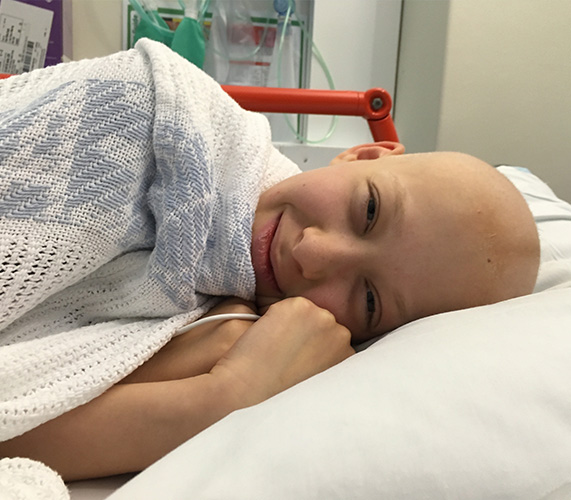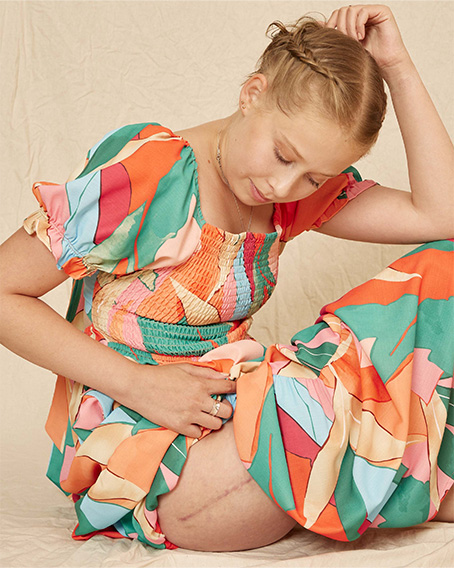Leading into November 2017, I was just a regular 14-year-old navigating school, friendships and everything that comes with being a teenager.
I began to experience persistent fatigue, unexplained bruising and other symptoms that didn’t quite make sense. I thought I was just run down from school but that all changed one afternoon. Mum noticed I wasn’t myself on school pickup. She asked me where we lived, and I couldn’t answer. That’s when she took me to the emergency department.

Image: Ruby and her family
Hearing the words “you have leukaemia” is something you’re never ready for, especially not at 14. It felt like everything just stopped. It didn’t feel real. I was trying to wrap my head around what it even meant, but it was just so overwhelming and scary. The truth is, I didn’t understand how serious it was. I can’t recall knowing anyone who’d had cancer before, so I wasn’t familiar with that world. I thought I’d just get better, just like when you have a cold. I had no idea how sick I really was.
I was rushed to Sydney Children’s Hospital, Randwick for specialist care and further testing. We had an anxious wait to find out what type of leukaemia it was and one week later, we received the news that I had an aggressive subtype of Acute Myeloid Leukaemia (AML). I would need a bone marrow transplant to survive.
Thankfully, my little brother was a perfect match. We had hope as I underwent four rounds of chemotherapy and in March, received the transplant. After an incredibly hard 23 days in isolation, I slowly started to gain strength. By July I was back at school, soon playing sport and even rang the end of treatment bell.
But nine months later, around my 16th birthday, everything changed.
Relapse and 120 days of isolation
Relapsing was one of the hardest things I’ve ever had to face. After everything I’d already been through, I truly believed the worst was behind me. Life had started to feel normal again - I was reconnecting with friends, returning to routines, and beginning to make plans. But then came the words I never wanted to hear, “you have relapsed”.
It felt like I was thrown straight back into the battle I thought I had already won. Only this time, I knew exactly how tough the road ahead would be and that made it all the more terrifying.
- Ruby
Hospital stays quickly became reality again. I had four rounds of chemotherapy and this time around, total body radiation. In July 2019, I received a second transplant from a stem cell donor and while the results were promising at first – I began to deteriorate and then came the isolation.
Not the kind most people imagine, but complete medical isolation – more than 120 days of being physically removed from the world. It was more than just physical, I felt emotionally disconnected too - as though life outside my hospital room was moving forward while mine had hit pause.
The days were repetitive. It was lonely. But I found strength in simply making it through the day. Relapse isn’t just a medical event; it’s a mental and emotional marathon. It may feel like your whole world is unravelling, but if there’s one thing I’ve learned, it’s that taking things one day at a time and finding small things you love—even in the toughest moments—can make the weight a little lighter. It won’t fix everything, but it will make the hard days more bearable. For me, it was puzzles, art, and trashy TV—especially the kind that made me laugh when I needed it most.
Challenges of cancer as an adolescent
Being diagnosed at 14 was incredibly difficult because it’s such a developmental time in life. You're figuring out who you are, building independence, and looking forward to the future—then suddenly, everything changes. Instead of worrying about school assignments and social events, I was dealing with hospital stays, chemotherapy, and a completely different reality.
One of the biggest challenges was feeling isolated. My friends were continuing with their lives—going to school, making memories—while I was stuck in a hospital room. It was also tough navigating how to maintain friendships when I physically wasn’t there. There were moments where I felt like I was missing out on everything that made me feel like a “normal” teenager.
My cancer journey through adolescence has completely reshaped my perspective on life. While most people were planning for their future—thinking about school and what comes next—I was just trying to make it through each day. I missed out on a lot of what makes adolescence special, but at the same time, I gained a level of resilience and appreciation for life that many don’t experience so young.
Education was another challenge. I had to navigate missing school, keeping up with studies, and figuring out what my future looked like when so much was uncertain. But I also found new passions and a drive to advocate for young people facing similar challenges.

Support from Youth Cancer Services

Being connected with the Sydney Youth Cancer Service and Canteen Connect reminded me that I wasn’t alone. I didn’t think I needed support at first because part of me was still in denial about having cancer at all. I didn’t want to accept it and reaching out felt like admitting it was real. Once I let go of that denial and opened myself up to the idea of support, everything started to shift.
The people I met through these services genuinely understood what I was going through. They offered more than just help and support—they offered friendship, connection, community, and hope. Looking back, I don’t know where my mental health would be if I hadn’t taken that step. Seeking support was one of the best decisions I’ve made, I am so grateful that I did.
Journey beyond cancer
2024 marked five years cancer-free and in my eyes that was a huge milestone. In many ways, it was a moment of celebration, of acknowledging everything I’d fought through. But I’ve also come to realise that finishing treatment doesn’t mean the journey ends. Life after cancer brings its own set of challenges.
While my body has been healing, my mind has had to process everything I’ve been through. Recovering isn’t just about being cancer-free; it involves a lot more than I initially thought, like rebuilding yourself physically, mentally, and emotionally.
There’s this unspoken expectation once you are cancer-free, things will go ‘back to normal’ - but there’s no going back. Recovery isn’t just about being free of the cancer - it’s about learning how to rebuild, how to feel safe in your body again and how to carry the weight of that experience without letting it define you.
- Ruby
Right now, I’m in a good place. I’m focused on my studies at university, on creative projects that give me purpose, and on sharing my story in the hope that it might help someone else feel less alone. There are still days when memories resurface, but I try to use those moments as fuel to keep moving forward. Healing is ongoing and I’m learning that that’s okay.
Looking towards life’s next chapter
My hopes for the future stem from everything I’ve been through and what I’ve learned along the way. I want to continue advocating for young people who are facing cancer or any kind of life-changing experience. I know how isolating it can feel, how overwhelming it can be to navigate a world that suddenly looks completely different to the one you’re used to. If I can use my voice, my story, or my platform to help even one person feel less alone, then that’s something worth striving for.
I hope to keep building spaces, whether through storytelling, media, or community work, where young people feel seen, heard, and supported. I’m passionate about communication, about connecting people to one another, and about using media to create meaningful change. One of the ways I’m doing this is through my Instagram page @leukwhoisliving, where I share stories that don’t always get the spotlight but absolutely deserve to be heard. I want that platform to grow, to become a place of empowerment and representation.
A message for adolescents facing a cancer diagnosis
Please know this—you are not alone. It might feel like everything is moving forward while your world has come to a standstill, but your journey matters. It’s okay to feel scared, overwhelmed, or even angry. Those feelings are valid.

There will be days that feel impossibly hard but there will also be moments of unexpected strength that you never knew you had in you. Hold onto hope and don’t be afraid to seek support and ask for help. Your voice, your story, your life - they all matter more than you know. Even when it doesn’t feel like it, you are so much stronger than you think.